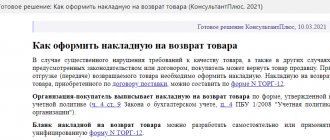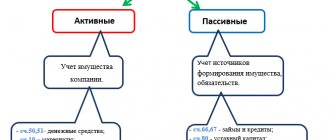Concept and organization of accounting in the Russian Federation
Organization of accounting is a set of system-forming elements and conditions of the accounting process necessary for the formation of complete and reliable information about the economic activities of an enterprise.
In order to comply with the law when carrying out business transactions, accounting must be organized at each enterprise. The head of the organization is responsible for this.
Depending on the volume of work, the manager can choose one or another form of accounting work:
- Approve the “Accounting” division in the organizational structure, headed by the chief accountant;
- Introduce into the staffing table the position of a single person accountant;
- Transfer, on contractual terms, the maintenance of accounting to a centralized accounting department, a consulting firm or a specialist accountant;
- Maintain accounting records in person.
The basic principles of accounting are determined by the legislation of the Russian Federation on accounting. The regulation of accounting on a national scale consists of the development and approval of regulatory documents for all enterprises on the territory of the Russian Federation:
- Federal Law on Accounting;
- Charts of accounts and instructions for use;
- Accounting Regulations (Standards);
- Other regulations and guidelines on accounting issues.
New details
The draft standard specifies additional information that should be in the primary accounting document. Thus, the primary accounting document must contain:
- an indication of the supporting document on the basis of which the primary document was drawn up;
- the date of the fact of economic life, if it differs from the date of preparation of the primary accounting document.
It is important to know:
Responsibility for loss of primary documents
Documents regulating the organization of accounting
- Federal Law “On Accounting” No. 402-FZ dated December 6, 2011;
- Regulations on accounting and financial reporting in the Russian Federation, approved. by order No. 34n dated July 29, 1998. (as amended on March 29, 2017);
- Chart of accounts for accounting of financial and economic activities of organizations and Instructions for its application, approved. by order No. 94n dated October 31, 2000. (as amended on November 8, 2010);
- “Regulations on accounting of long-term investments” (approved by letter of the Ministry of Finance of the Russian Federation dated December 30, 1993 No. 160);
- Civil Code of the Russian Federation;
- Accounting policy of the organization.
The Ministry of Finance of the Russian Federation forms a special group of normative documents regulating the accounting procedure for individual areas: standards:
- Accounting Regulations (PBU). They are developed taking into account the main provisions of international accounting standards.
List of current PBUs adopted by the Ministry of Finance of the Russian Federation
- PBU 1/2008 Accounting policy of the organization, approved. by order of the Ministry of Finance of Russia dated October 6, 2008 N 106n;
- PBU 2/2008 Accounting for construction contracts, approved. by order of the Ministry of Finance of Russia dated October 24, 2008 N 116n;
- PBU 3/2006 Accounting for assets and liabilities in foreign currency, approved. by order of the Ministry of Finance of Russia dated November 27, 2006 N 154n;
- PBU 4/99 Financial statements of the organization, approved. by order of the Ministry of Finance of Russia dated July 6, 1999 N 43n;
- PBU 5/01 Accounting for inventories, approved. by order of the Ministry of Finance of Russia dated 06/09/2001 N 44n;
- PBU 6/01 Accounting for fixed assets, approved. by order of the Ministry of Finance of Russia dated March 30, 2001 N 26n;
- PBU 7/98 Events after the reporting date, approved. by order of the Ministry of Finance of Russia dated November 25, 1998 N 56n;
- PBU 8/2010 Estimated liabilities, contingent liabilities and assets, approved. by order of the Ministry of Finance of Russia dated December 13, 2010 N 167n;
- PBU 9/99 Income of the organization, approved. by order of the Ministry of Finance of Russia dated 05/06/1999 N 32n;
- PBU 10/99 Organizational expenses, approved. by order of the Ministry of Finance of Russia dated May 6, 1999 N 33n;
- PBU 11/2008 Information on related parties, approved. by order of the Ministry of Finance of Russia dated April 29, 2008 N 48n;
- PBU 12/2010 Information on segments, approved. by order of the Ministry of Finance of Russia dated November 8, 2010 N 143n;
- PBU 13/2000 Accounting for state aid, approved. by order of the Ministry of Finance of Russia dated October 16, 2000 N 92n;
- PBU 14/2007 Accounting for intangible assets, approved. by order of the Ministry of Finance of Russia dated December 27, 2007 N 153n;
- PBU 15/2008 Accounting for expenses on loans and credits, approved. by order of the Ministry of Finance of Russia dated October 6, 2008 N 107n;
- PBU 16/02 Information on discontinued activities, approved. by order of the Ministry of Finance of Russia dated July 2, 2002 N 66n;
- PBU 17/02 Accounting for expenses on R&D and technological work, approved. by order of the Ministry of Finance of Russia dated November 19, 2002 N 115n;
- PBU 18/02 Accounting for corporate income tax calculations, approved. by order of the Ministry of Finance of Russia dated November 19, 2002 N 114n;
- PBU 19/02 Accounting for financial investments, approved. by order of the Ministry of Finance of Russia dated December 10, 2002 N 126n;
- PBU 20/03 Information on participation in joint activities, approved. by order of the Ministry of Finance of Russia dated November 24, 2003 N 105n;
- PBU 21/2008 Change in estimated values, approved. by order of the Ministry of Finance of Russia dated October 6, 2008 N 106n;
- PBU 22/2010 Correction of errors in accounting. accounting and reporting, approved. by order of the Ministry of Finance of Russia dated June 28, 2010 N 63n;
- PBU 23/2011 Cash flow statement, approved. by order of the Ministry of Finance of Russia dated 02.02.2011 N 11n;
- PBU 24/2011 Accounting for costs for the development of natural resources, approved. by order of the Ministry of Finance of Russia dated October 6, 2011 N 125n;
What documents govern accounting?
Alexey Ivanov talks about the current system of regulatory regulation of accounting in Russia: FSB, OSBU and all, all, all. It took shape during the implementation of the reform, but many accountants managed not to notice that the rules of the game had changed. And even in the latest accounting textbooks there are descriptions of a system that has been abolished since 2013.
Hi all! Alexey Ivanov is with you, the knowledge director of the online accounting “My Business” and the author of the telegram channel “Accounting Translator”. Every Friday on our blog at The Clerk I talk about accounting. I started with the basics, then I will move on to more complex matters. For those who are just preparing to become an accountant, this will help them get to know the profession better. Seasoned chief accountants should look at familiar categories from a different angle.
I continue to cover accounting reform. Although it sometimes slips, it moves. Today I will tell you about the already existing system of regulatory regulation of accounting in Russia. It took shape during the implementation of the reform, but many accountants managed not to notice that the rules of the game had changed. What about ordinary accountants? In accounting textbooks published in 2021, there are descriptions of a system that worked until 2013! From their student days, future drunks receive a distorted vision of reality.
The main accounting regulatory document is Federal Law dated December 6, 2011 No. 402-FZ “On Accounting”. According to Article 21 of this law, documents in the field of accounting regulation are divided into:
- federal accounting standards (FSBU);
- industry accounting standards (ASBU);
- regulations of the Central Bank of the Russian Federation;
- recommendations in the field of accounting;
- standards of an economic entity.
FSBU establish acceptable methods of accounting. They are mandatory for everyone. For example, FSBU 5/2019 “Inventories,” which came into force on January 1, 2021, allows inventory to be assessed when written off in one of three alternative ways. This means that to evaluate a specific type of inventory in a specific company, you need to choose one of these methods. There is no other way to evaluate it. By the way, the PBUs familiar to Russian accountants - Accounting Regulations - are also FSBU. In 2021, Article 30 of Law No. 402-FZ was supplemented with such clarification.
OSBU establishes the specifics of the application of FSBU in certain sectors of the economy. ASBs are mandatory for companies in relevant industries. They are developed by the Central Bank or the Ministry of Finance and approved by them. So far, only the first one is actually developing OSBU. The absence of other developers of OSBU makes the financial sector of the economy the only industry that has its own standards. This is very strange, but it is a fact. A couple of years ago, my university colleagues and I did research for the Ministry of Agriculture. Ministerial officials were very surprised that, it turns out, for five years now they have not had the authority to issue methodological guidelines on accounting for individual agricultural sectors. Just a bow to the Ministry of Finance - nothing else.
The regulations of the Central Bank of the Russian Federation are a continuation of the OSBU for the financial sector. Charts of accounts, instructions for them and reporting forms descend to this level. Like all circulars of this department, they are mandatory for use in the financial sector, that is, banks, insurance organizations, microfinance organizations, and pawnshops.
Recommendations in the field of accounting detail the procedure for applying FAS and OSBU. They are needed when it is difficult to understand from the top-level standards how to reflect a specific specific situation in accounting. The recommendations interpret FSBU and OSBU into instructions that are understandable for an accountant. They are developed and adopted by non-governmental regulators. Unlike FSBU and OSBU, recommendations are not mandatory for use.
For example, we have developed a draft recommendation “Accounting for energy service contracts with the contractor.” It is needed when the contractor enters into an agreement with the customer, according to which, at his own expense, he replaces the customer’s equipment with a more energy-efficient one. In the future, the customer gives the contractor a portion of the savings on electricity bills. Not a single accounting regulatory document describes such a situation. There are energy service agreements, but the accounting procedure is different for everyone. When the recommendation is accepted, it will be easier for auditors or the court to justify the correctness of the accounting.
The standards of an economic entity are accounting policies and other documents that are developed and approved within the company and apply only to it.
️Finally, an important clarification. The system of accounting standards is hierarchical - subordinate documents should not contradict higher ones. In case of discrepancies, the parent document must be followed.
By the way, the “My Business Professional Accountant” service has flexible accounting policy settings that an accountant can set individually for each client. And accounting and tax reporting is submitted electronically directly from the service without using separate TKS. Try it for free using this link - it's convenient and saves a lot of time!
Federal Law of the Russian Federation on Accounting
The main legislative act regulating accounting is the federal law “On Accounting”, N 402-FZ dated December 6, 2011 . The Accounting Law regulates the following issues:
- Defines objects and basic requirements for accounting;
- Reveals the basic concepts used in the legislative regulation of accounting;
- Establishes the rights and obligations of officials of the enterprise, as well as liability for violation of the requirements of the legislation on accounting;
- Determines the main tasks of accounting, requirements for the preparation and maintenance of primary accounting documents and accounting registers;
- Establishes deadlines and general requirements for conducting an inventory of the property and liabilities of the enterprise;
- Establishes deadlines, general requirements and procedures for submitting financial statements;
Regulations on accounting and reporting of the Russian Federation
Regulations on accounting and financial reporting in the Russian Federation, approved. by order No. 34n dated July 29, 1998. establishes the procedure for organizing and maintaining accounting, drawing up and submitting financial statements by legal entities. It was developed on the basis of the Law “On Accounting” and clarifies the application of certain requirements of the law. The provision is secondary in relation to the Law “On Accounting” and is the basis for all regulatory documents developed by the Ministry of Finance of the Russian Federation. The regulation establishes the possibility of choosing from two or more options for reflecting individual business transactions. For example, an enterprise can choose the method and form of accounting, the method of assessing materials, methods of calculating depreciation of fixed assets and intangible assets, etc. In order for the accounting of an enterprise to comply with the requirements of the regulations, it is necessary to ensure constant monitoring of the state of the legislative and regulatory framework.
All company documents can become primary
It will be possible to use documents drawn up within the framework of civil law relations as primary documents. For example, an agreement, a cash receipt, a payment receipt, a receipt, a service contract, a service assignment, an order for employment, an order for dismissal, an advance report. But, provided that these documents contain all the required details of the primary accounting document.
More on the topic:
Which primary will be changed and approved in a new way?







